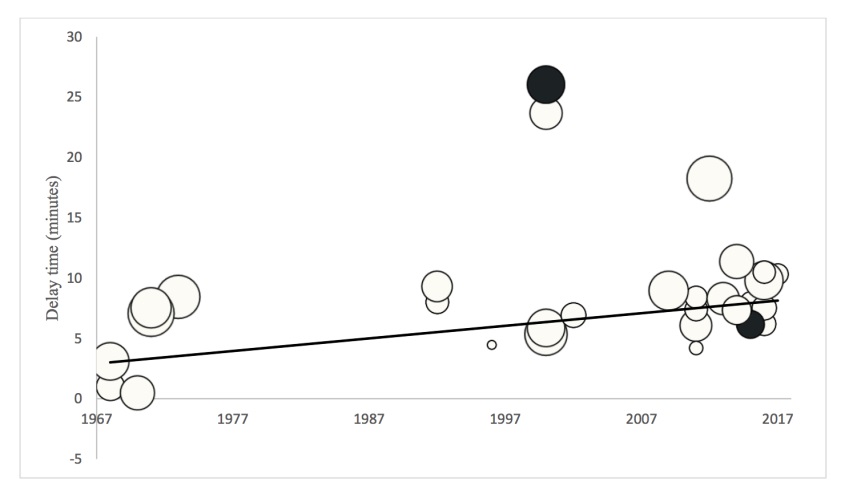Children of today are better at delaying gratification than previous generations
|
|||||||||||||

From Protzko / OSF, 2017
If you believed the copious alarmist commentary in the newspapers, you’d fear for the future of our species. Today’s children, we’re told, are more hyperactive and technology addicted than ever before. They’ve lost any ability to sit still, instead craving constant stimulation from digital devices and exhausted parents.
What might this mean for their performance on the most famous psychological measure of childhood self-control, Walter Mischel’s Marshmallow Test? Surely, kids of today will struggle far more than previous generations to resist the lure of one marshmallow (or other treat) now for the promise of two in ten minutes or so, as the task requires? In a new survey, the majority of child development experts certainly believed so.
Yet based on his analysis of 50 years worth of performance data on the Marshmallow Test – released as a preprint at the Open Science Framework – John Protzko at the University of California, Santa Barbara, concludes that in fact children of today are capable of more self-restraint than previous generations, with their ability to delay gratification having increased by about a minute per decade over the last 50 years.
Protzko combined the results from every published and unpublished use of the Marshmallow Test that he could find, starting with Mischel’s seminal work first published in 1968 and including 4 studies in the 1970s, 3 in the 1990s, 6 in the 2000s, and 16 in our current decade, all involving children aged ten or younger. Protzko speculates that the gap in the 1980s is due to the introduction at that time of a rival test of self-regulation which is quicker to administer – the so-called gift-delay task.
Before crunching the numbers, Protzko polled 260 members of the Cognitive Development Society Listserv about how they thought the results would come out. Just over 50 per cent predicted that Protzko would find children’s powers of self-restraint would be lower today than the in past; 20 per cent predicted no change over time; and just 16 per cent believed that children today would outperform the children of the past (the others said there wouldn’t be enough data to answer the question).
Protzko found a statistically significant linear trend – children’s ability to resist immediate temptation and wait for a greater reward seems to have increased over the decades (this remained true when removing two study outliers, marked as black circles in the graph above). The increase in delay of gratification ability is similar in size to the known increase in average IQ seen over the same timescale, possibly reflecting shared mechanisms, though this is speculation at this stage. Meanwhile, variation in Marshmallow Test performance has stayed the same over the decades, which means that average improvement has been seen across the spread of ability, not just among those children who are more self-restrained.
How could the experts have got it so wrong? Protzko’s suggests they are prone to same bias as the rest of us, what he calls the “kids these days” phenomenon: “people’s memories for their own and others’ abilities in childhood are unduly influenced by their current abilities. While it is easy to look at kids these days and deride their inability to control themselves and decry the downfall of civilisation, it is much harder to accurately recall our own selves as children.”
Does the apparent improvement in children’s powers of self-control bode well for the future, for instance in terms of reduced criminality and addiction? Protzko thinks not, speculating that it is probably one’s ability relative to others, rather than one’s absolute ability, that is relevant to future behaviour – the lowest performers will remain at risk, he suggests. “These [unhealthy and dangerous] behaviours have been with humans for thousands of years, and will be with us for thousands more,” he predicts.
The causes and consequences of the apparent increase in children’s powers of self-restraint over time remain to be uncovered by future research. For now, Protzko says the data show that “Contrary to historical and present complaints, kids these days appear to be better than we were. A supposed modern culture of instant gratification has not stemmed the march of improvement.”
—Kids These Days: 50 years of the Marshmallow task [Note this study has not yet been subject to peer review]
Christian Jarrett (@Psych_Writer) is Editor of BPS Research Digest
Christian Jarrett (@Psych_Writer) is Editor of BPS Research Digest





